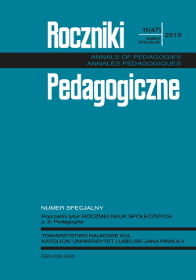Main factors determining the functioning of the system of social re-adaptation of offenders – diagnosis and development
Main Article Content
Abstract
The changing picture of the state’s criminal policy and the leading role of sanctions alternative to deprivation of liberty, i.e. the sanctions of fine and restriction of liberty, accompanied with limited educational-rehabilitative role of a probation officer, lead imperceptibly to the evolution of his tasks. At the same time, there is a growth in the expectations regarding the improvement of effectiveness of tasks aiming at helping an ex-convict to social rehabilitation that is usually perceived as providing supporting, material or administrative provisions and services. Recognizing these phenomena, the author presents a systemic approach to social re-adaptation of convicts, relying on a new, hybrid model of a preparation of a convict to live without liberty restrictions. The system, based on participants’ mutual knowledge about themselves, is not complicated, is comprehensible and should become common. The Author sees the institution of a probation officer, whose tasks have not been precisely legally described, having a central role in the system. At the same time, it has been indicated what possibilities are given by the observation of the functioning system, considering its effectiveness that may be used in the prognosis of re-offending regarding the convicts who will be subject to system’s influence.
Article Details
References
Hołyst, B. (2016). Kryminologia (wyd. 11). Warszawa: Wydawnictwo Naukowe PWN.
Jaroch, W. (2012). Polityka karna – strategia punitywna czy liberalna. Studia Prawnoustrojowe, 15/12, 49-61.
Krukowski, A. (1982). Problemy zapobiegania przestępczości. Warszawa: PWN.
Pierzchała, K. (2015). The Process of Social Reintegration of Convicts on the Background of World Penitentiary System. The Analytical and Synthetic Outline of the Issue [Proces readaptacji społecznej skazanych na tle światowego systemu penitencjarnego. Zarys analityczno-syntetyczny zagadnienia]. Polskie Towarzystwo Nauk Politycznych i Polska Akademia Nauk. Polish Political Science. Yearbook, 44, 154-170.
Pierzchała, K. (2016). Destygmatyzacja przestępców w świetle Magisterium Kościoła oraz poglądów na resocjalizację. Kraków: Oficyna Wydawnicza „Impuls”.
Stasiorowski, S. (2013). Uczestnictwo społeczeństwa w wykonywaniu orzeczeń – cele i zadania Rady Głównej do Spraw Społecznej Readaptacji i Pomocy Skazanym. Probacja, 2, 143-156.
Stochmal, M., Maciejewski, J. (2018). Hybrydyzacja obszarów badawczych środowiska (nie)bezpieczeństwa nie tylko w dyscyplinie socjologii. Historia i Polityka, 23 (30), 87-101.

